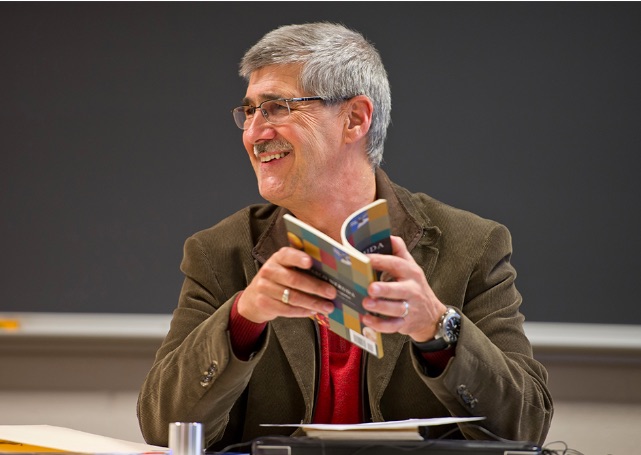… EDUCATION FOR PEACE …
An article from the Eastern Mennonite Univeraity
Internationally renowned peacebuilder John Paul Lederach, who has committed his life and work to nonviolent approaches to conflict for more than 40 years, has been awarded the 36th Niwano Peace Foundation Peace Prize.

(Photo courtesy of the Kroc Institute)
Lederach, currently a senior fellow at Humanity United, is a co-founder and the first director of the Eastern Mennonite University’s Center for Justice and Peacebuilding, which celebrates its 25th anniversary in 2020. He holds the title of distinguished scholar and sits on CJP’s Board of Reference. Lederach is also professor emeritus of international peacebuilding at the University of Notre Dame’s Kroc Institute for International Peace Studies, where he taught for 15 years.
The prize recognizes Lederach’s scholarly and practice work in “mediating conflicts, building peace, and fostering international reconciliation,” according to a Niwano Peace Foundation release. “He has developed training in conflict transformation and provided direct conciliation support services in some of the most violently conflicted regions across five continents.”
“His books, lectures, workshops and conversations offers grounded, practical insights into the complex nature and dynamics of conflict and how to transform it,” said committee member Ahn Jae Woong, immediate past president of the YMCA of Korea and former general secretary of the Christian Conference of Asia. As with his teaching, his approach is one that encourages people to embody the core principles of the faith tradition that guides them.”
Nominations are solicited annually. Selected by a committee of 11 global religious and spiritual leaders, recipients are honored for their leadership to interreligious cooperation in the cause of peace.
“EMU has benefited greatly from the visionary peace-building leadership of John Paul Lederach, and we extend our congratulations to him on the occasion of this prestigious award,” said President Susan Schultz Huxman.
Lederach will attend a ceremony May 8 in Tokyo, where he will be presented with a gold medal and the subsidiary prize of $180,000. He will also address the Niwano Peace Foundation, dignitaries and global peace leaders.
“It is a profound honor to receive this 36th Niwano Peace Prize,” Lederach said, in his acceptance letter. “Your recognition gives us courage that our global beloved family can move beyond hate, division, and exclusion and create the bonds that truly heal.”
Lederach expressed thanks for the support and commitment of his family as well as many others, in the Mennonite tradition and those of diverse faiths, who have influenced his practice, writing and scholarship.
(Articles continued in right column)
Where in the world can we find good leadership today?
(continued from left column)
“Peacebuilding is not about a single person but rather how whole collectives cohere, how communities rise and respond to challenges, and how families stay strong,” he said.
Aiding in his own work at building cohesive peacebuilding collectives, Lederach named several EMU practitioners. The urging of Vernon Jantzi, then professor of sociology and social work (now professor emeritus) at EMU, convinced Lederach to return to academia after many years in the field with Mennonite Central Committee and other organizations.
The duo, with several other contributors from Colombia, Kenya and the United States, helped to found the Conflict Transformation Program at EMU, now known as the Center for Justice and Peacebuilding, and the Summer Peacebuilding Institute, in response to demand and need among practitioners for training and generative conversations in the areas of conciliation, peacebuilding and restorative justice.
This award “helps us all appreciate more fully the magnitude of the sea change that John Paul has helped create here at EMU and in the global peacebuilding field,” said Jantzi. “His low-key, inclusive approach has partially obscured how revolutionary his vision and practice have been. A people-centered practitioner, down-to-earth philosopher, artist, and engaging teacher, he has always believed that durable peacebuilding happens when we manage to bring the best of our humanity to bear on our most inhumane behavior and structures.”
Jantzi particularly praised Lederach’s “articulation, enrichment and expansion” of the concept of peacebuilding through his life of service, pedagogy and practice.
Among the other “extraordinary people” Lederach credits with helping him to “understand patient accompaniment and courage in forging peace” are several accomplished CJP graduates and Summer Peacebuilding Institute participants and instructors:Hizkias Assefa, Babu Ayinde MA ‘98, Rose Barmasai, Dekha Ibrahim, and Florence Mpaayei, of Kenya, Emmanuel Bombande MA ‘02, from Ghana; Joe Campbell MA ‘02, from Northern Ireland; Ameet Dhakal MA ‘02 and Preeti Thapa, from Nepal; Sam Doe MA ‘98, from Liberia; and Myla Leguro, from Mindanao.
Lederach also urged inclusive participation of youth and women in national negotiations, conference panels or locally led peace efforts in his acceptance letter.
He also lifted up a unified and faith-filled commitment to discovering, sharing and practicing nonviolent alternatives to conflict: “For me, the deepest aspirations of my faith tradition provided inspiration to move beyond barriers and boundaries. The infinite, boundless, and audacious love of the Divine toward humanity stirs us to notice and learn from this gifted diversity, to build lasting and improbable friendships across our brokenness, and to fearlessly seek to understand those with whom we disagree.”
Recent recipients of the Niwano Peace Prize include the Adyan Foundation, Lebanon, 2018; Bishop Dr. Munib A. Younan, Palestine, 2017; the Center for Peace Building and Reconciliation, Sri Lanka, 2016; and Pastor Esther Abimiku Ibanga, Nigeria, 2015.
(Editor’s note: The methodologies developed by John Paul Lederach during the 1980’s in Central America and Africa were an important contribution to the development of the Culture of Peace Programme at UNESCO in the 1990’s.)